China World
Anti-Japanese Sentiments on Weibo after News of Shinzo Abe Getting Shot in Nara
On Weibo, some are gloating over the shooting of Shinzo Abe, who has been called the “‘chief’ anti-China politician in Japan.”
Published
3 years agoon
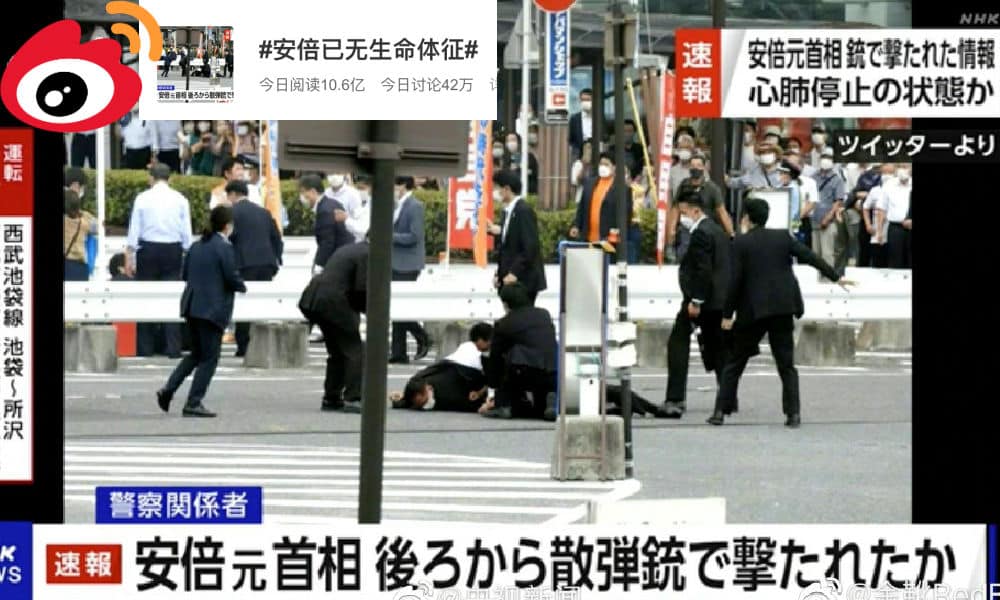
The shocking news that Shinzo Abe was shot twice during a campaign speech in the city of Nara on Friday morning has become top trending on Weibo, where many commenters show little sympathy for Japan’s former Prime Minister.
In the morning of July 8, 2022, Japan’s former Prime Minister Shinzo Abe (安倍 晋三) was shot twice during a speech for an election campaign event in the city of Nara. According to the latest reports, the 67-year-old Abe has been rushed to hospital. Update: just before 18:00 local time, news came out that Shinzo Abe died after being shot.
The shooting incident happened around 11:30 when Abe was giving an Upper House election campaign speech in front of Yamato-Saidaiji Station of the Kintetsu Line.
Ex-Tokyo governor Yoichi Masuzoe (舛添要一), who was also at the event in Nara, tweeted that the former President was suffering “cardiopulmonary arrest” (心肺停止状態), meaning he is showing no vital signs.

According to the Asahi newspaper, a 41-year-old man by the name of Tetsuya Yamagami has been arrested on suspicion of attempted murder and the weapon was seized.
On Chinese social media, the incident immediately became a trending news topic and various images were shared showing the alleged suspect. Other photos showed the former Prime Minister laying on the ground surrounded by medical staff. The hashtag “Abe Shows No Vital Signs” (#安倍已无生命体征#) received over a billion views on Friday.
One Weibo news post about the shooting by CCTV received over 1,6 million likes. The top comment said: “Exam candidates, remember this for extra points: July 7 is the day of the 1937 Marco Polo Bridge Incident that started China’s War of Resistance against Japan; July 8 the day when Japanese Prime Minister Shinzo Abe was shot and killed.” The comment received nearly 100,000 likes.

Influential media blogger Zhang Xiaolei (@张晓磊) posted: “Walking alone down a dark alley*, this man will go down in the history of Japan,” referring to the gunman.
Some of the comments called the shooter a ‘hero’, saying he would not just go into Japanese history, but also would be remembered in Chinese history books. The comment that “this is a historical day” is a recurring one on Weibo today.
Former Prime Minister Abe was President of Japan’s Liberal Democratic Party (LDP), and he was the longest-serving prime minister in Japanese history from 2006 to 2007 and then again from 2012 to 2020. He retired as Prime Minister in 2020 due to health reasons.
“An old man gets shot and falls to the ground yet you are gloating over it. Where is the morality? Where is your bottom line?“
In China, Abe has never been popular. After his 2020 retirement, he visited the controversial Yasukuni Shrine war memorial just days after stepping down. An 2021 editorial in the Chinese state media outlet Global Times called the former Prime Minister the “chief anti-China politician in Japan.” In a 2021 Security Dialogue on Taiwan-US-Japan, Abe said that “Taiwan must be a leader among democracies.” Some weeks earlier, he had also stated that “a Taiwan emergency is a Japanese emergency,” urging China not to provoke its neighbors or seek territorial expansion.
In 2017, a video of a Japanese kindergarten recital saying that the disputed Senkaku/Diaoyu islands belong to Japan and that China should not “spread lies” about Japan went viral and sparked controversy on Chinese social media. That incident also put Shinzo Abe in a bad light as his wife previously visited the school, and he had reportedly once said that the ideology of the school’s chairman was similar to his.
Anti-Japanese sentiments often surface on Chinese social media, where the history of the Second Sino-Japanese War (1937-1945) is still actively remembered (read more here).
“Shinzo Abe needs to let go of his hatred, excuse the gunman, and erase this part from history,” another popular Weibo comment said, sarcastically referring to previous Japanese history textbook controversies regarding the silencing of Japan’s war crimes.
But there are also those who are condemning those who apparently delight in the fact that the former Prime Minister was shot. One popular Weibo comment criticized these Weibo users, writing: “An old man gets shot and falls to the ground yet you are gloating over it. Where is the morality? Where is your bottom line?”
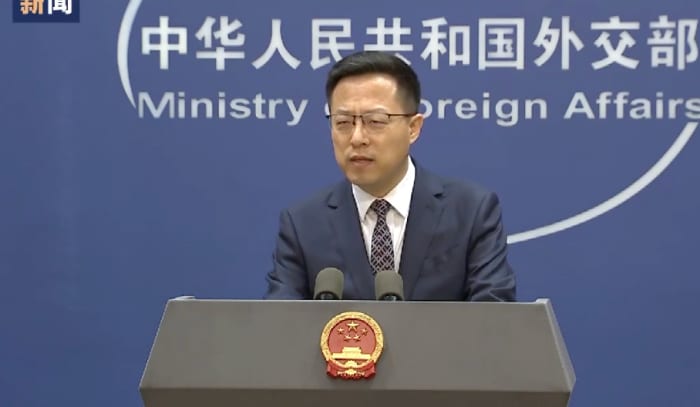
Chinese Foreign Ministry spokesperson Zhao Lijian (赵立坚) commented on the attack on Shinzo Abe during a regular press briefing on July 8, expressing shock and concern, adding: “We hope that former Prime minister Abe will be out of danger and recover soon.”
Some could not resist making a sarcasting comment in the post reply section, writing: “There is still the danger that he might live?”

Despite all the reactions expressing a negative stance toward Abe and Japan, some Weibo users are posting a candle emoticon for the former Prime Minister, writing: “Sending prayers for Shinzo Abe.”
Update: On Friday late afternoon, local media reported that Shinzo Abe died after the attack. Soon after, before 18:00 CST, the hashtag “Shinzo Abe Passed Away” (#安倍晋三身亡#) became the number one topic on Chinese social media platform Weibo, with the hashtag page receiving over 280 million views within thirty minutes.
Also read: Chinese Reporter Cries during Live Broadcast on Shinzo Abe Attack
To get more insights on Shinzo Abe, we can recommend The Iconoclast: Shinzo Abe and the New Japan by Tobias Harris (2020).
By Manya Koetse
* “孤身走暗巷”, “walking alone in a dark alley”, comes from a song titled “Lonely Warrior” (孤勇者) by Eason Chen.
Get the story behind the hashtag. Subscribe to What’s on Weibo here to receive our weekly newsletter and get access to our latest articles:
Spotted a mistake or want to add something? Please let us know in comments below or email us. First-time commenters, please be patient – we will have to manually approve your comment before it appears.
©2022 Whatsonweibo. All rights reserved. Do not reproduce our content without permission – you can contact us at info@whatsonweibo.com.
Manya is the founder and editor-in-chief of What's on Weibo, offering independent analysis of social trends, online media, and digital culture in China for over a decade. Subscribe to gain access to content, including the Weibo Watch newsletter, which provides deeper insights into the China trends that matter. More about Manya at manyakoetse.com or follow on X.

You may like
China Insight
US-Russia Rapprochement and “Saint Zelensky”: Chinese Online Reactions to Trump’s Shake-Up
From shifting sentiments on Zelensky to a renewed focus on Taiwan, recent geopolitical developments have sparked noteworthy takes from Chinese online commentators.
Published
3 weeks agoon
March 9, 2025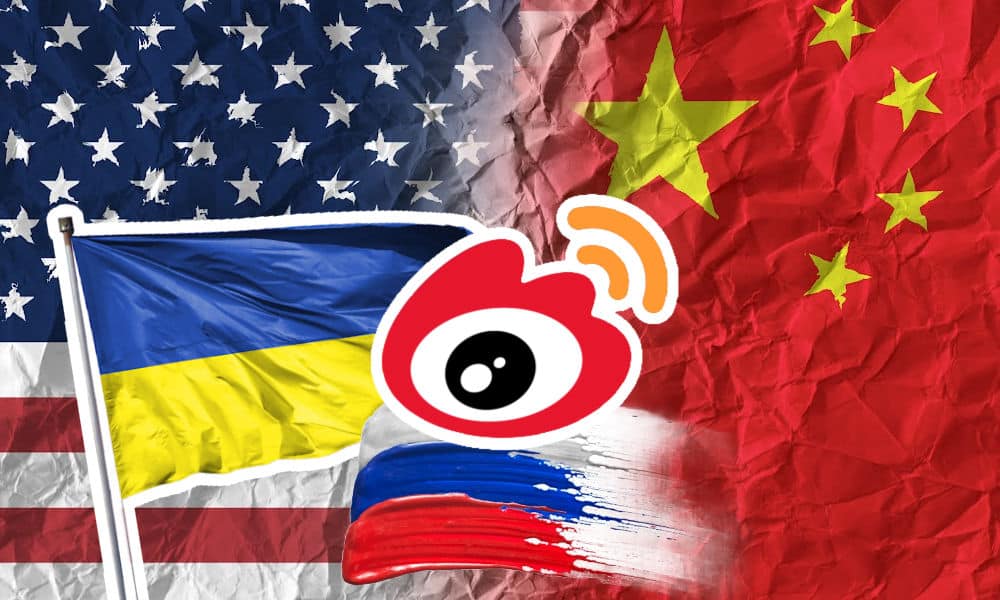
As the Russia-Ukraine war enters its fourth year, Chinese social media is once again flooded with discussions about the geopolitical shifts triggered by Trump’s policies. From the Oval Office clash to Trump’s ‘pivot’ to Russia, this article explores how Chinese netizens are interpreting the rapidly changing geopolitical landscape.
Three years ago, when the Russia-Ukraine war first broke out, one particular word went trending on Chinese social media: wūxīn gōngzuò (乌心工作). The term was a wordplay on the term wúxīn gōngzuò (无心工作), meaning not being in the mood to work, and it basically meant that people were too focused on Ukraine to concentrate on work.
Although that word has since faded from use online, recent geopolitical developments surrounding the Russia-Ukraine war have once again drawn considerable attention on Chinese social media, where trending word data tools show that “Trump” and “Zelensky” are among the hottest buzzwords of the moment.
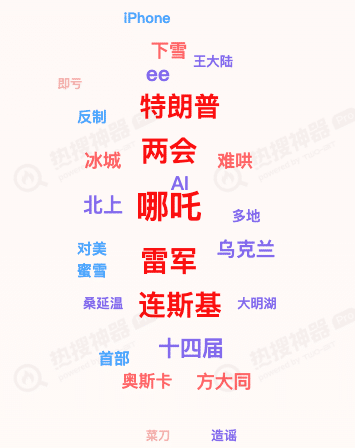
Trump Zelensky, Ne Zha, Lei Jun; biggest words of interest on, among others, Weibo, on March 4, 2025.
Trump’s recent rhetoric toward Russia, his remarks about Ukraine, and his attitude toward NATO not only mark a shift from Biden and decades of US policy, but also reshuffle the geopolitical cards and raise questions about the future of the postwar international order.
Where does China stand in all this?
➜ Although China’s online environment is tightly controlled, particularly regarding political discussions, what stands out in conversations around the recent developments involving Trump, Putin, and Zelensky is a widespread sentiment that — at its core — it’s all about China.
Many believe that China’s rise on the global stage, and the resulting US-China rivalry, are key forces shaping US strategy toward Russia as well.
Woven into these discussions are US-China trade tensions, with Trump increasing tariffs by 10% on February 1, and then doubling the tariff on all Chinese imports to 20% from 10% on March 4. This immediately prompted China to retaliate with 10-15% tariffs on US agricultural products, effective March 10.
Currently, developments are unfolding so rapidly that one hashtag after another is appearing on Chinese social media. “It’s not that I don’t understand, it’s just that the world is changing so quickly,” one Weibo blogger commented, referencing a famous song by Cui Jian (“不是我不明白,是这世界变化快”).
Amid this whirlwind of events, let’s take a closer look at the current Chinese online discourse surrounding the Russia-Ukraine war, with a focus on shifting attitudes toward Zelensky and US-Russian relations.
THE OVAL OFFICE INCIDENT
“Saint Zelensky is a real man!”
One major moment in the recent developments has been the clash between Zelensky, Trump, and US Vice President JD Vance in the White House Oval Office on February 28.
Zelensky had come to the White House to discuss the US’s continued support against Russia and a potential deal involving Ukraine’s rare earth minerals, but it ended in a heated confrontation during which, among others, Zelensky questioned Vance’s notion of “diplomacy” with Putin, and Trump and Vance expressing frustration with what they perceived as Zelensky’s ingratitude for US support.
On Chinese social media, the clash between Zelensky, Trump, and Vance in the Oval Office seemingly caused a shift in public views towards Zelensky and the position of Ukraine. Some commentators who are known to usually take a pro-Russian stance were suddenly positive about Zelensky.
“Zelensky is really awesome, he had a confrontation with Putin’s two top negotiators in the Oval Office and still managed to hold his own,” historian Zhang Hongjie (@张宏杰) jokingly wrote on Weibo.
Others compared compared Trump and Vance to “two dogs barking” at Zelensky, and saw the meeting as one that was meant to humiliate Zelensky.
Nationalist blogging account “A Bad Potato” (一个坏土豆, 335k+ followers) admitted: “I’ll lay my cards on the table: I fully support Zelensky.”
He further wrote:
💬 “Let’s not make any illusions. Trump’s ultimate target is China. (..). He’s already added two rounds of 10% tariffs on China. Isn’t it obvious? Did you think he is pulling closer to Russia for some big China-Russia-America unification? Once he’s done dealing with his internal problems, he’ll inevitably come at China with full force. There are some people here who are hoping for Zelensky to kneel before the US, and I’d like to ask these people: Whose side are you on? Are you on the Russian or American side? When Zelensky’s firm towards the US, of course I’ll support him. His performance was so perfect that I’d like to call him Saint Zelensky!
(..) Some say Zelensky’s betraying his country. So what if he is? As long as he’s not selling out China, he can sell out the whole world for all I care. Just look at the stupid and bad Macron, or Starmer who’s full of sneaky tricks, they’re getting humiliated by Trump in all kinds of ways. Then look at Zelensky again and let me shout: Saint Zelensky is a real man! He’s a tough guy! Of course, I’m keeping it balanced here—I support Russia too. Both sides must make an effort.”
➜ Although there is some pragmatism in this ‘pro-Zelensky’ shift, which is Sino-centric and mostly based on which actors in the political game are considered antagonists of China, there is also another level of sympathy towards Zelensky as the underdog in this situation — facing a 2-against-1 dynamic on unfamiliar terrain, while speaking a language that is not his.
Weibo user “Uncle Bull” (@牛叔, 820k followers) wrote:
💬 “The arguing scene in the Oval Office should be a reminder for every politician that it doesn’t matter how well you speak English, when it’s a formal occasion, you should always speak your native language and have a translator with you— it helps avoid a lot of direct confrontations.”
In his analysis of the situation, well-known political commentator Chairman Rabbit (兔主席) took a far more critical stance towards Zelensky, suggesting that his confrontational attitude in the Oval Office was misplaced and driven by personal pride, and that his actions in the White House caused it to be “the most disastrous trip in history.”
Chairman Rabbit also commented:
💬 “There is an ancient Chinese saying: “A man of character can bow or stand tall as required [大丈夫能屈能伸].” When it comes to major issues like the survival of the nation, things like some dignity and righteousness and principles all are meaningless. When facing Trump, you just have to flatter and appease him. If Zelensky is unable to humble himself, then he’s probably not suited for this job. It’s just as the most pro-Ukraine Republican senator, Senator Lindsey Graham, said – he suggests that Zelensky should step down, and Ukraine should find someone else to negotiate.”
But there are many netizens who do not agree with him, like this popular comment saying: “Whatever you do, don’t kneel [to Trump] — you’re a spiritual totem (精神图腾) for so many people on Weibo.”
TRUMP’S ‘PIVOT’ TO RUSSIA
“The US-Russia honeymoon has begun”
When US and Russian delegates sat down in Riyadh, Saudi Arabia, on February 18 to discuss improving Russia-US relations and ending the war in Ukraine—without Europe or Ukraine at the table—Chinese netizens pointed out that there were no plates on the table, joking that “Europe and Ukraine are what’s on the menu.”
They referred to a comment previously made by US Secretary of State Antony Blinken when replying to a question about US-China tensions leading to greater fragmentation: “If you’re not at the table in the international system, you’re going to be on the menu.”
The official Chinese response to the developments, as stated by Chinese Foreign Ministry spokesperson Guo Jiakun (郭嘉昆), is that China is glad to see any efforts that contribute to peace, including any consensus reached between the US and Russia through negotiations (#中方回应俄美代表团举行会晤#).
Among social media users, there was banter about the sudden US-Russia rapprochement, after news came out that the two countries intend to cooperate on various matters concerning their shared geopolitical interests (#俄美决定未来将在多领域合作#).
“The US-Russian honeymoon has begun [美俄蜜月开始]!” some commenters concluded.
“It won’t last more than four years,” others predicted.
Some suggested it might be an opportunity for China and Europe to draw closer: “China and Europe will also cooperate on various matters.”
Regarding Putin agreeing to assist in US-Iran talks (#美媒爆普京同意协助美促成与伊朗核谈判#), reactions were cautiously optimistic: “It’s hard to find an American president seeking peace as much as Trump is,” one Weibo user wrote. Another added: “He might be pursuing ‘America First,’ but his efforts for peace deserve some acknowledgement. I hope it’s true.”
➜ Outside of China, analysts and commentators have argued that a US-Russia rapprochement could be bad for China, suggesting it might undermine the close strategic partnership between China and Russia. However, this sentiment seems less pronounced on Chinese social media, where many argue US-Russian relations are bound to be fickle, while others echo the official stance.
The official response to such concerns, as stated by Ministry of Foreign Affairs spokesperson Lin Jian (林剑), is that the China-Russia bilateral relationship “will not be affected by any third party”:
💬 “Both China and Russia have long-term development strategies and foreign policies. No matter how the international landscape changes, our relationship will move forward at its own pace. The US attempt to sow discord between China and Russia is doomed to fail.”
Another perspective comes from Chinese political scientist and commentator Zheng Yongnian (郑永年), in a recent interview with Xiakedao (@侠客岛), a popular commentary account from People’s Daily Overseas Edition.
Zheng noted that the US-Russia shift is not surprising—considering, among other things, Trump’s previous comments about his good relationship with Putin—but that it places Ukraine and Europe in an unfavorable position.
➜ Like other commentators, Zheng suggests that Trump’s strategy to improve ties with Russia is also linked to gaining leverage over China. However, he does not necessarily view it as a direct revival of Kissinger’s famous Cold War-era strategy, which aimed to align with China to counter the Soviet Union. In this case, it would be reversed: allying with Russia to counter China (“联俄抗中”). In Trump’s view, Zheng argues, Europe doesn’t matter, and Ukraine is insignificant. Russia is the key to maximizing US interests.
➜ Like others—and in contrast to some foreign analyses—Zheng does not see the U.S.-Russia rapprochement as necessarily harmful to China. Instead, he suggests that right-wing, pragmatic partners may ultimately be more beneficial to China than left-wing ideological ones, stating:
💬 “When it comes to the Russia-Ukraine conflict, the previous Biden administration continuously tried to frame China, attempting to shift the blame onto China. So now, after the US and Russian leaders spoke, the Chinese Ministry of Foreign Affairs responded by saying they are ‘pleased to see all efforts working for peace, including Russia and the US coming to a common understanding that will lead to peace.’ China won’t meddle in another country’s internal affairs. No matter who’s in power, we will engage with them. China can indeed take a relatively neutral stance.
In the past, we said, ‘It’s easier to deal with the right-wing in the West.’ Why? Because the political right is less hypocritical; they value interests, and interests can be exchanged. Some Western left-wing factions, however, cling to ideological patterns, labeling and defining you, making exchange and interaction impossible.”
SHARPENED FOCUS ON TAIWAN
“Ever since Trump came to power and betrayed Ukraine, the rhetoric towards Taiwan has become increasingly tough”
Although there may be mixed views and different analyses, one thing is certain: Trump’s strategies are shaking things up from how they used to be.
➜ One thing that doesn’t change in rapidly changing times, is an overall anti-American sentiment on Chinese social media.
Even though some commenters appreciate Trump’s pragmatism or are entertained by the spectacle of US politics from the sidelines, there remains a strong belief that US strategies are ultimately aimed against China. This reinforces anti-American sentiments and fuels discussions about a potential US-China conflict.
This is especially tangible at a time when the US government has once again raised tariffs on Chinese imports.
“If war is what the U.S. wants—be it a tariff war, a trade war, or any other type of war—we’re ready to fight till the end,” China’s embassy in Washington posted on X, reiterating a government statement from Tuesday.
During the Two Sessions on March 7, Foreign Minister Wang Yi (王毅) also commented on US-China relations, stating:
💬 “No country should harbor the illusion that it can suppress and contain China on one hand while seeking to develop a good relationships with China on the other. Such two-faced behavior [两面人] is not only detrimental to the stability of bilateral relations and cannot build mutual trust.”
➜ Against this backdrop, the Taiwan issue has once again come into sharp focus.
This is partly driven by the two Two Sessions (March 5-11), China’s annual gathering of the National People’s Congress (NPC) and the Chinese People’s Political Consultative Conference (CPPCC). This is not just a major political event but also a key moment for propaganda and political messaging.
But it is mostly linked to the broader, rapidly changing geopolitical sphere and Trump’s shifting stance on Russia and Ukraine. The narrative of US power politics failing to change the course of a China-Taiwan “reunification” is surfacing again precisely because of Trump’s reshuffling of alliances.
Since the Russian invasion of Ukraine in 2022, Chinese social media users have frequently drawn comparisons between Taiwan and Ukraine. The phrase “Today’s Ukraine, tomorrow’s Taiwan?” gained traction at the time, as online commenters saw Ukraine’s rapid invasion as a cautionary tale for Taiwan, highlighting how quickly the situation could change. A viral meme from that period depicted a pig labeled “Taiwan” watching another pig, “Ukraine,” being slaughtered.
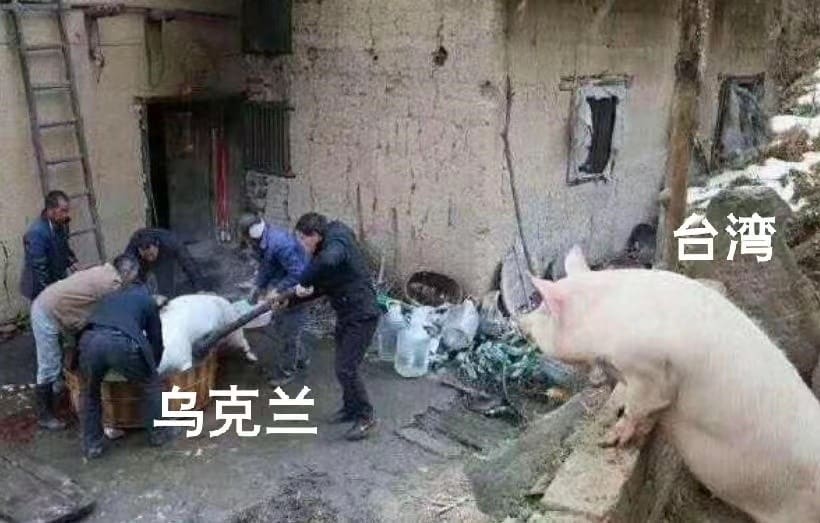
A meme circulating on social media in 2022 showing a pig “Taiwan” watching the slaughtering of another pig “Ukraine.”
This week, Chinese state media launched a large-scale social media propaganda campaign using strong language and clear visuals to reinforce the narrative that Taiwan is not a country, that it is part of China, and that reunification is inevitable.

Such rhetoric has appeared before, with similar peaks in Taiwan propaganda dating back to at least 2022. The topic of Taiwan has often been amplified during key political events, such as the 20th Party Congress and Xi Jinping’s speech in October 2022.
“Have you noticed?,” Weibo author Yangeisaibei (@雁归塞北) wrote: “Ever since Trump came to power and sold out Ukraine, the rhetoric towards Taiwan has become increasingly tough, the tones become more stern, and the words more straightforward.”
According to prominent Weibo blogger @前HR本人, who has over two million followers, the Taiwan issue is now more important than before.
💬 “When it comes to foreign struggles, resolving the Taiwan issue is China’s top priority. Judging from the Chinese Embassy in Washington declaring “We are not afraid of any kind of war with the US”, it seems we are already preparing to reunify Taiwan at any moment.”
Another Weibo blogger (@王江雨Law, 419k fans) wrote:
💬 “Now that all kinds of big and smaller developments are changing the [political] climate, especially if America’s strong territorial expansion claims turn into concrete actions, this could trigger synchronous reactions, greatly increasing the possibility of resolving the Taiwan issue within a few years. We need to rethink the previous view that the mainland is not in a hurry on this matter.”
What emerges from these discussions is that Chinese online discourse on the Russia-Ukraine war and US foreign policy is primarily centered around two key ideas:
🔸 The belief that China is ultimately at the core of US geopolitical strategies in its dealings with Russia.
🔸 A pragmatic, Sino-centric view in which support or opposition to leaders like Trump, Putin, or Zelensky shifts depending on what serves China’s interests best.
Rather than seeing the conflict in black-and-white terms, many Chinese netizens approach it as a dynamic political chess game, one in which China should play a smart and confident strategy.
Politics-focused blogger Mingshuzhatan (@明叔杂谈, 137k followers) wrote:
💬 “In the process of this game against US, we must respect them in tactics, and contempt them in strategy [战术上重视、战略上藐视] – stay patient and confident. Trump is currently going against the tide, he’s being destructive. But actually, this recklessness is damaging US credibility and its global influence, it will accelerate the decline of American hegemony. A silent majority of countries in the international community harbor growing resentment and disappointment toward the US, and when these sentiments reach a tipping point, America will truly experience the pain of “un unjust cause draws little support” [失道寡助]. China, on the other hand, although also facing some challenges, focuses on science and technological and industrial innovation. That’s the right path for China’s long-term stability, prosperity, and security. In the China-US competition, it is becoming increasingly evident that time is on China’s side.”
This perspective reflects a dominant theme across Chinese online discussions: No matter how intense the geopolitical shifts may be, or how much the US reshuffles its global strategy, China remains on its course and is playing the long game.🔚
By Manya Koetse
(follow on X, LinkedIn, or Instagram)
Spotted a mistake or want to add something? Please let us know in comments below or email us. First-time commenters, please be patient – we will have to manually approve your comment before it appears.
©2025 Whatsonweibo. All rights reserved. Do not reproduce our content without permission – you can contact us at info@whatsonweibo.com.
China Military
“Li Jingjing Was Here”: Chinese Netizens React to Rumors of “Chinese Soldiers” in Russian Army
“We should tell Li Jingjing to come home. Risking your life on the battlefield for Russia is not worth it!”
Published
4 weeks agoon
March 3, 2025
A video that has been making its rounds on X and Bluesky on March 2/3 has fueled speculation about whether Chinese nationals might be serving in Russian military units.
Ukrainian commentator and former adviser to Ukraine’s Minister of Internal Affairs, Anton Gerashchenko, posted:
“A video appeared online that reportedly shows Chinese people wearing a Russian military uniform. One of them has a marking of a Russian Bars military unit. It is reported that the video was filmed in the Pokrovsk direction, Donetsk region. The video has not been verified, it is unclear where and when it was filmed.”
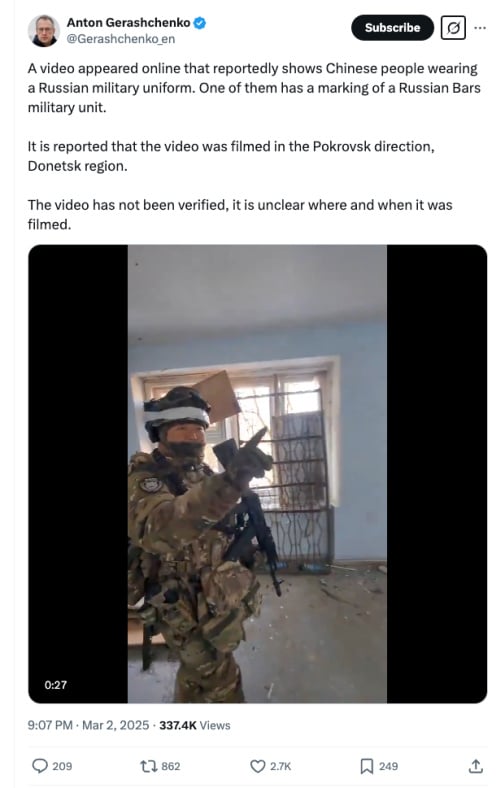
The footage shows two soldiers inside an abandoned building, with one of them writing in Chinese on the wall: “Li Jingjing was here” (“李晶晶到此一游”). The two also exchange a few words in Chinese, saying things like, “Ah, I wrote it wrong again.” One of them wears an armlet belonging to BARS (Combat Army Reserve of Russia) military unit.
On one side of the wall, the words “-Wèi Precision Installation” (..卫精工安装) are written.
Other X accounts, including the influential Chinese account @whyyoutouzhele, pro-Ukrainian Oriannalyla (@Lyla_lilas) and UAVoyager (@NAFOvoyager) also posted the video on March 2nd, alleging that the footage came from Selydove, Donetsk region, and shows Chinese soldiers as part of Russian forces in the Pokrovsky direction. The source of the video posted by the second X user is the Telegram channel “Donbas Operative.”
Meanwhile, on Weibo, the same video is also being discussed by various commentators and netizens.
Digital & tech blogger ‘Ma Shang Tan” (@马上谈), who has over 480,000 followers on the platform, dismissed the rumors as fake, writing:
“Li Jingjing was here! Ukrainian media have published a condemning the presence of Chinese soldiers in the Russian camo… but that’s really too one-sided. Just because they write Chinese doesn’t mean they represent the Chinese people. First, Russia is offering high pay to recruit mercenaries, attracting people from all over the world who are willing to risk their lives for money. Second, as Russia continues to suffer losses, they’ve turned their focus to ethnic groups from the Far East, recruiting quite a few people in the army, many of whom will know Chinese characters.
Anyway, who even is this Li Jingjing? 😂😂😂😂”
Some commenters note that these soldiers “clearly aren’t Chinese,” some pointing to their appearance, others to how the characters were written—suggesting the characters are written “too wide.”
“This kindergarten level of characters is supposed to be written by a Chinese person?” another person wondered.
“I can immediately tell these are characters written by Koreans,” one Weibo user commented.
Since October 2024, South Korean intelligence has been reporting the presence of North Korean troops in Russia. However, their participation was never officially confirmed by Moscow or Pyongyang.
Another Weibo blogger, the military blogger “Earth Lens A” (@地球镜头A), with more than 950,000 followers, suggested that the “soldiers” could be Chinese, but that they are most likely people dressing up:
““Li Jingjing was here?” Ukrainian social media are framing it as if Chinese people are fighting in the war in the Russian forces. After fabricated claims of “North Koreans fighting in Kursk,” Ukrainian sources are now loudly claiming that Chinese troops have appeared near Pokrovsk, based on a random short video without any source.:
““…Precision Installation”? [“..精工安装”: referring to characters written on the wall in the abandoned building] These people wearing Russian military uniforms and speaking Chinese are either military enthusiasts from China doing cosplay or they’re some vloggers who went to Russia “pretending to be in combat.” Can’t say much else. Speaking of which, they should [do more to] control those Douyin and Kuaishou creators who claim to be fighting on the front lines.”
There is a thriving “cosplay culture” on Chinese short video platforms, and military cosplay is a part of that. Among Chinese younger people, cosplay (‘costume play’) has become increasingly popular over the past years. Cosplay allows people to become something they are not—a superhero, a villain, a sex symbol, a soldier—sometimes Chinese, American, Japanese, or Russian.
Some commenters allege that this particular video was made by creators on the video platform Bilibili, although there is currently no proof of that.
“It’s just some military fans playing in a dilapidated building,” another person wrote.
Meanwhile, there seems to be growing fascination over who Li Jingjing actually is.
“We should urge Li Jingjing to come home!” one blogger wrote: “It’s not worth dying on the Russian battlefield.”
They jokingly added: “Li Jingjing, your mom is calling you home for dinner!”
The phrase is a reference to a famous moment in Chinese internet history when a comment appeared on a World of Warcraft forum saying that a boy named Jia Junpeng was being called home for dinner by his mom (read here).
For some netizens, the fact that this video and its virality are being taken seriously on Western platforms seems to be a source of entertainment: “This video of Chinese cosplayers has started circulating on Twitter (X). It’s hard not to laugh watching their serious analysis.”
By Manya Koetse
(follow on X, LinkedIn, or Instagram)
Spotted a mistake or want to add something? Please let us know in comments below or email us. First-time commenters, please be patient – we will have to manually approve your comment before it appears.
©2025 Whatsonweibo. All rights reserved. Do not reproduce our content without permission – you can contact us at info@whatsonweibo.com.
Subscribe

How K-pop Fans and the 13-Year-Old Daughter of Baidu VP Sparked a Debate on Online Privacy

Squat or Sit? China’s Great Toilet Debate and the Problem of Footprints on the Seat

Weibo Watch: The Great Squat vs Sitting Toilet Debate in China🧻

Chinese Netizens Turn to Tim Cook Over Battery Factory’s Illegal Overtime

Revisiting China’s Most Viral Resignation Letter: “The World Is So Big, I Want to Go and See It”

Our Picks: Top 10 Chinese Buzzwords and Phrases of 2024 Explained

“Dear Li Hua”: The TikTok/Xiaohongshu Honeymoon Explained

Beyond the Box Office: What’s Behind Ne Zha 2’s Success?

Weibo Watch: Christmas in China Is Everywhere and Nowhere

Weibo Watch: A New Chapter

15 Years of Weibo: The Evolution of China’s Social Media Giant

Tuning Into the Year of the Snake

The ‘China-chic Girl’ Image and the Realities of China’s Competitive Food Delivery Market

TikTok Refugees, Xiaohongshu, and the Letters from Li Hua

“Black Myth: Wukong”: From Gaming Screens to the CMG Spring Festival Gala?
Get in touch
Would you like to become a contributor, or do you have any tips or suggestions? Get in touch here!
Popular Reads
-

 China Insight11 months ago
China Insight11 months agoThe Tragic Story of “Fat Cat”: How a Chinese Gamer’s Suicide Went Viral
-

 China Music12 months ago
China Music12 months agoThe Chinese Viral TikTok Song Explained (No, It’s Not About Samsung)
-

 China Digital10 months ago
China Digital10 months agoChina’s 2024 Gaokao Triggers Online Discussions on AI
-

 China Arts & Entertainment11 months ago
China Arts & Entertainment11 months agoSinging Competition or Patriotic Fight? Hunan TV’s ‘Singer 2024’ Stirs Nationalistic Sentiments




